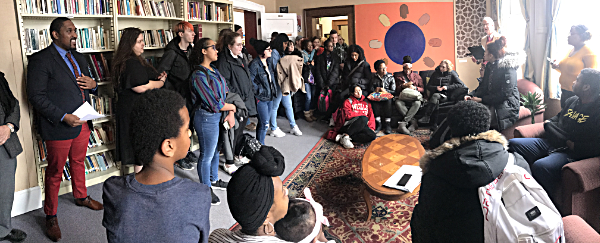- By Christopher Pollock
- Around Town
 Print
Print  Photo Courtesy of Wells College
Photo Courtesy of Wells CollegeAurora, NY - Wells College celebrated the grand opening of its new center for multiculturalism with an uplifting event on Friday, Feb. 28, 2020 that was attended by dozens of students, staff and faculty. Dubbed the "Hallway for Cultural Humility," the newly renovated space is intended to bring together students from different backgrounds to promote mutual understanding and appreciation of their differences. The event served as the grand finale to a month's worth of campus programming in conjunction with Black History Month.
The area, which encompasses an interconnected suite of rooms on the first floor of the Main Building, was previously the home of the College's Office of Student Affairs, which recently moved to the newly renovated Sommer Center. That renovation opened the door, literally, to providing a long-desired physical space for multicultural activities on campus.
For weeks, the College's Office of Student Equity and Inclusion worked with Wells students from the Women's Resource Center and multiple other campus groups and individuals to organize the new space, bringing in lounge furniture, a library of books on various topics, posters, and even newly painted original murals.
"The students who gather in the rooms along this hallway will challenge each other's preconceptions, break down biases, and explore opportunities for collaboration," Dean of Students Charles Kenyon said at today's ceremony. "The Hallway for Cultural Humility is tangible proof that Wells intends to embrace all of its students as equal members of our Wells family," he added.
André Lynch, coordinator of student equity and inclusion, was the driving force behind the effort to create this new space, a project that was initiated in 2018 by his predecessor, Latesha Fussell, former director of campus life for diversity and inclusion. "Some members of our community believe that a cultural center would allow self-segregation, and possibly divide our student body . . . but, in fact, this new space will achieve the exact opposite effect," Lynch said. "It will allow for folx who do not identify as members of an affinity group to learn about folx who are different. Further, it allows space to be dedicated to the marginalized, in order to increase campus connectivity," he added.
The Hallway for Cultural Humility will serve as a comfortable, flexible space for students to collaborate socially, academically and culturally—a home base for students to host workshops, lectures, discussions, meals and other activities. In other words, as André Lynch noted in his remarks, it will be a "space where students are encouraged to be their authentic selves, while navigating the sometimes-muddy waters of academe." Highlights of the space include two original murals created by Maya Solana '20 and Keelan McGreevy '21.
"With every conversation and every dialogue we have, it's about truth, it's about respect, it's about honesty, and it's about imparting your knowledge into somebody else. I think that is the core reason that we have a space like this," said Kara Reynolds '20, president of Collegiate Cabinet, the College's student government association. "We're grateful to have this space, and I hope it continues to grow," she continued. "It's a space where you can invite people to educate themselves, because if we can change ourselves, that does some good—but, if we can also change those around us, that would have an even bigger impact."
Jobe Zulu, case manager for student outreach and support, echoed Reynolds' sentiments: "I really hope this is a safe space where students feel comfortable having challenging conversations for change, and then incorporating those conversations to put that change needed into place," Zulu said.
The concept of "cultural humility"—which originated in the health care field as a way for practitioners to better connect with patients of diverse backgrounds—centers around the idea that a humble and respectful attitude toward individuals of other cultures pushes us to challenge our own inherent cultural biases. The movement stresses the need to: maintain a lifelong commitment to self-evaluation and self-critique; to have a desire to fix power imbalances where none should exist; and to forge partnerships with other individuals and groups who advocate for positive social change.
v16i10



